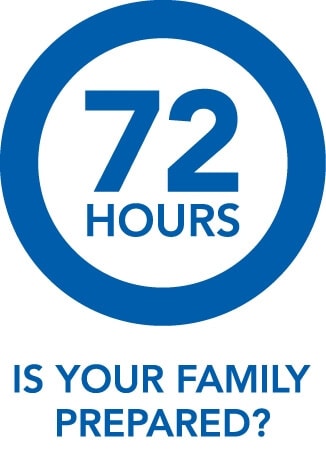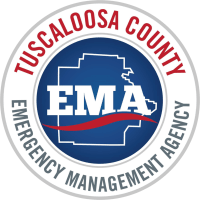
Preparation is an important and necessary part of surviving a disaster. Emergencies can happen suddenly and without warning. When disaster strikes, you may find yourself without power or access to clean, running water. You may be stranded and unable to reach family and friends. You may also find yourself without help for up to 72 hours. Prepare for emergencies with a 72-hour grab-and-go bag. A grab-and-go bag is a pre-packed bag filled with things you may need for 72 hours if you have to suddenly evacuate your home. Preparedness Handouts for adults and youth are available at the Tuscaloosa County EMA office. Please feel free to stop by to pick up these free handouts.
BE INFORMED
Be informed by finding out what type of emergencies can affect you and learning how you should be prepared for them. Go to the following link for more information – CLICK HERE
Sign up for TuscALERT to get the latest weather alerts and other important updates - CLICK HERE Call us if you need assistance.
Learn what to do when a Watch or a Warning is issued: Be Aware Be Prepared Take Action A Guide for Alerts and Warnings It is also good to make sure you are able to get other alerts like Wireless Emergency Alerts (WEAs) and Integrated Public Alert and Warning System (IPAWS). Signing up for TuscALERT helps you get these types. To learn more about these types go to: Emergency Alerts
Learn and know what to do during an emergency/disaster. Click be-informed and scroll through the issues you may face on the left side.
Know where you are in the state. Most people can't pick out the county they live in on a state map. CLICK HERE to see a state map. To see a map of Tuscaloosa County CLICK HERE. See if you are in a flood zone on the FEMA Flood map by CLICKING HERE.
MAKE A PLAN
Make a plan with your family of what you will need to do to communicate and stay safe in an emergency as well as finding each other during or afterwards. Go to the following link for more information – CLICK HERE
General plans
FEMA's Disaster Preparedness Guide for Older Adults
FEMA's An In-Depth Guide to Citizen Preparedness
CDC Personal Emergency Preparedness Info
US Department of Homeland Security
FEMA Family Communications Plan
FEMA’s Emergency Financial First Aid Kit and/or FEMA's Financial Preparedness website
Red Cross - Disasters and Financial Planning
Learn How to Take Shelter: At home, at work, or out shopping click to learn how to take shelter at the location you are in.
Family Disaster Plan: A family disaster plan is a document that outlines how to prepare your family to face an emergency.
Disaster Preparedness Guide for Older Adults
Information for your Pets and Animals
Disability Disaster Plan: A disability, and others with access & functional needs disaster plan is a document that outlines caring for a person with disabilities in an emergency.
FEMA Individuals with Disabilities
Red Cross Disabilities Emergency Preparedness
- Business Disaster Plan: A Business Disaster Plan is a document that assists businesses and industry in planning for disaster, including the safety of employees and protection of corporate assets. The 2019 version is available for purchase at NFPA.org
For the Resilience in a Box where business leaders can learn about disaster preparedness and business resilience - CLICK HERE
For 10 Preparedness Actions to Help Your Organization Remain OPEN - CLICK HERE
Other business resources: Ready. gov Business Toolkits and Emergency Management Guide for Business and Industry and Make a Plan
- School Disaster Plan: All school districts, colleges, and Universities have disaster plans specific to their District. Please check with your child's school.
Others who should have disaster plans: Check with these organizations to see if they have a plan in place and request to review the plan. If a plan is not in place, templates are available through FEMA, The American Red Cross, and healthcare accrediting agencies.
- Apartment Complexes - For a Sample Emergency Plan from the State of Utah CLICK HERE
- Day Care/Pre-School - For guidance from the State of Alabama CLICK HERE For another example CLICK HERE
- Assisted Living Facilities
- Skilled Nursing Facilities
- Hospitals
- Churches - For church plans go to our ReadySunday area by CLICKING HERE
- Insurance: The U.S. Department of Homeland Security's Federal Emergency Management Agency (FEMA) recommends for homeowners to schedule an appointment with an insurance agent. Agents can provide owners and renters with a policy that matches their needs when provided with a home inventory list. In addition, after a disaster, an inventory can help provide proof of personal property loss. Government and industry officials also recommend taking photos of the outside of a home as well as all contents and storing these photos together with the inventory list in a safe place away from the house.
- Property owners may be required to have both hazard and flood insurance. Renters should also consider insurance to protect personal belongings. Standard hazard policies may require additional riders for items such as collectibles, jewelry, and/or damage from sewage backup. Disaster assistance from FEMA and other agencies cannot provide the extensive protection individuals can get from insurance.
- It takes 30 days for a flood policy to take effect, so you need to purchase flood insurance before flooding happens.
- National Flood Insurance Program website and flood maps click: Flood Insurance
- MANAGING BUSINESS INSURANCE CLAIMS Click Here for more information about how to manage a business insurance claim after a disaster.
Renters Insurance: Apartments and landlords’ property insurance covers the BUILDING and structural damage, but does not cover a tenant’s property. Renters Insurance covers the items INSIDE the structure(s).
A standard renters insurance policy usually covers the following:
- Personal Property – the things you own
- Loss of Use – living expenses if you move while your apartment is repaired – like rent, food, etc.
- Personal Liability – protects you if someone else is hurt in your home and for legal fees if they sue
Policies may differ. Verify what your policy covers. Most policies cover damage from fire, theft, or storms. Some additional things you may want to consider adding are more liability, extra coverage in general (for jewelry, art, or electronics), and business coverage (for home-based businesses or working-from-home professionals).
BUILD A KIT OR GO BAG
Build a kit with the supplies necessary to survive during and after an emergency. Since you do not know where you will be when an emergency occurs, it's a good idea to prepare supplies for home, work and vehicles. The following link has detailed information about what should be in an emergency kit – CLICK HERE
For Pets and Animals: CLICK HERE
For more information, visit the following websites:
Ready Tuscaloosa website – CLICK HERE
Ready Alabama website – CLICK HERE
FEMA preparation and safety website – CLICK HERE
ACTION STEPS
CLICK HERE to see action steps for homes or businesses that may help you prepare and reduce or mitigate the impact of a disaster.
Practice and Maintain your plan:
- Quiz your family and kids every six months or annually so they remember what to do.
- Remind them it is only for emergencies and show them how to turn the water, gas, and power off.
- Conduct fire, tornado, chemical release, and emergency evacuation drills at home, church, and office.
- Replace stored water every three months and stored food every six months. (buy a new pack of water and drink the old)
- Test and recharge your fire extinguisher(s) according to the manufacturer's instructions.
- Test your smoke detectors monthly and change the batteries at least once a year.
- Check to make sure you know where the shutoff is for the natural gas, water, and power.
- If things in your neighborhood or even around your neighborhood have changed since your plan creation, look to see if your plan needs to be updated to reflect those changes.
- Encourage neighbors through neighborhood meetings to gather information, make a plan, build a kit and practice their plan with their family.
- Don’t forget to update documents, copies, and insurance coverage when needed or yearly.
- If you have added pets, children, or other family members to your household make sure to update and add documents and supplies to your kit.
- Annually get rid of old electronics or harmful chemicals. For more info click: Electronics and Chemical Recycling
Learn what to do and how to help until help arrives. CLICK HERE
Other tips or factors to consider before the arrival of severe weather: (a few days to 2 weeks) CLICK HERE
Get Involved
Take the Community Emergency Response Team (CERT) Classes to learn skills and how to respond in emergency situations. CLICK HERE
Become a volunteer with you local Volunteer Fire Department
Become a volunteer with your local chapter of the American Red Cross
Take a look at FEMA TRAINING courses.
